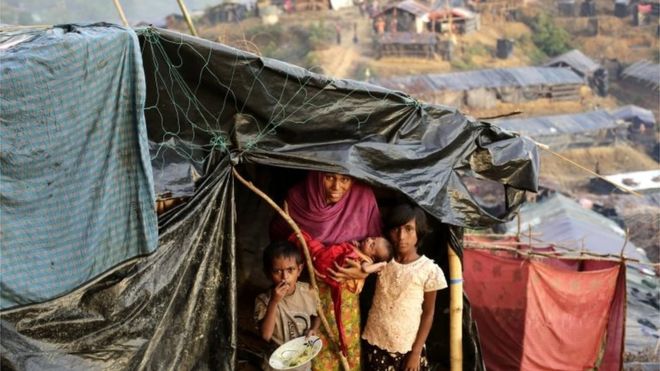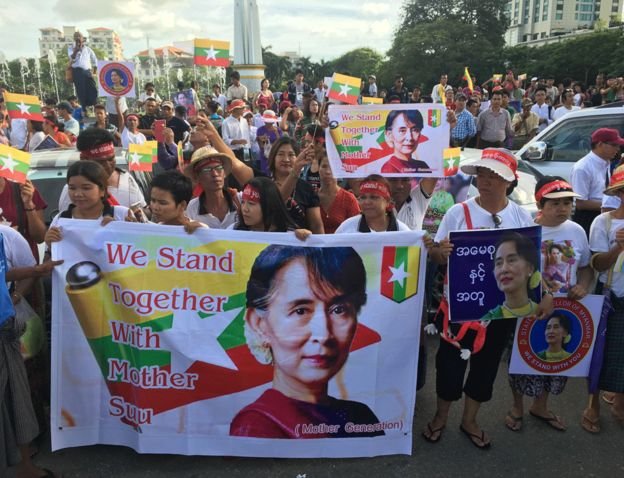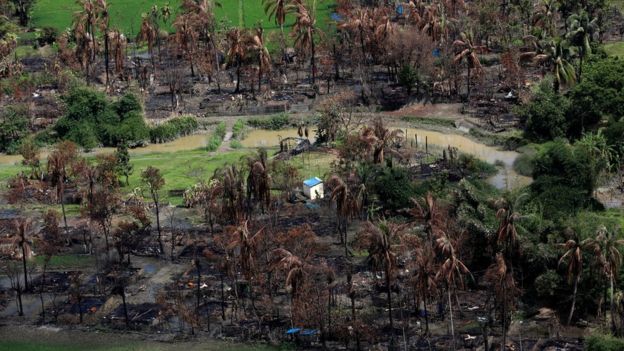The story not being talked about in Myanmar

Looking from Yangon, you would never know that a major humanitarian crisis has been unfolding for more than a month in Myanmar's western region of Rakhine.
More than half a million Rohingya Muslims have fled across the border to Bangladesh since militants attacked police posts on 25 August, unleashing a massive military crackdown.
The Burmese authorities have been under mounting pressure to end the violence, address instability in Rakhine, and grant humanitarian access.
But the country's biggest city is a picture of calm on the surface, with clean roads, plenty of greenery and orderly - if congested - traffic. Well-dressed men and women get on with their daily lives.
People here don't use the term Rohingya. They are portrayed in the media as "Bengali Muslims" and some even describe them as illegal Bengali immigrants from Bangladesh.
When I have raised the Rohingya issue, people were either forthright in their opinion or tried to gloss over the topic, saying "there are many other issues in this country".
This includes senior journalists, like U Aung Hla Tun, vice-chairman of the Myanmar Press Council.
"The problem is the political motive behind the term [Rohingya]. I used to have a number of Bengali friends when I was young. They never claimed they were Rohingya… They first coined the term a few decades ago," he said.
"They [Rohingya] do not belong to the ethnic minorities [of this country]. This is a fact."
Rohingya and others dispute that.
UN failures on Rohingya revealed
'Mass Hindu grave' found in Rakhine state
Truth, lies and Aung San Suu Kyi
Reality Check: Fake photos of Myanmar violence
While the crisis has dominated headlines around the world for weeks, newspapers here have hardly any mention of the plight of Rohingya now living in squalid conditions in camps in Bangladesh.
Instead, articles have given prominence to reports of the army finding mass graves of Hindus allegedly killed by Arakan Rohingya Salvation Army (Arsa) militants.
At the University of Yangon I wondered if I would find a different mood among students. Their links with the outside world through social media are much better than those from earlier generations.
In the university café some students were reluctant to talk. Some did not want to give their names. But when I broached the Rakhine issue, the response was instant.
"This issue is seen from outside as a religious problem. But it is not. The violence is an act of terrorism. The international community is getting wrong information about the situation in the Rakhine state," a female student said.
"From abroad, you think you are right, but from our side we are right."
Similar views were expressed by two of her friends.

A few days later I went to a commemorative event marking the 10th anniversary of the 2007 pro-democracy protests. Thousands of Buddhist monks joined the demonstrations, which became widely known as "the Saffron Revolution".
The pictures of saffron-clad monks revolting against the military junta caught the world's imagination.
The anniversary event was held inside a monastery in southern Yangon, decorated with banners recalling the momentous protests. Buddhist monks, pro-democracy activists and union members who took part in the 2007 protests turned out in large numbers.
I was expecting that as many of them were former political prisoners, who had been jailed for supporting human rights and democracy, there would have been a divergent view on the Rohingya issue.
Shwe Toontay Sayar Taw was one of the leading monks in the Saffron Revolution. I asked him as a young democracy, isn't it Myanmar's responsibility to treat all communities, including the Rohingya, equally?
"In democracy all are equal," he said, adding "but not terrorists".
"If they take up terrorism [then] all the people of the world should unite to destroy terrorism. Otherwise they will destroy our generation."
No doubt the Rohingya Muslim issue has boosted support among the majority Burmese for Aung San Suu Kyi, whose protracted silence over the issue has drawn condemnation from around the world.
Rallies are held in front of the city hall in Yangon supporting the country's de-facto leader.
Senior UN officials have described the violence against Rohingya Muslims as "ethnic cleansing" - a charge denied by the Myanmar government
keep it up
wel
Its nice post.
thanks